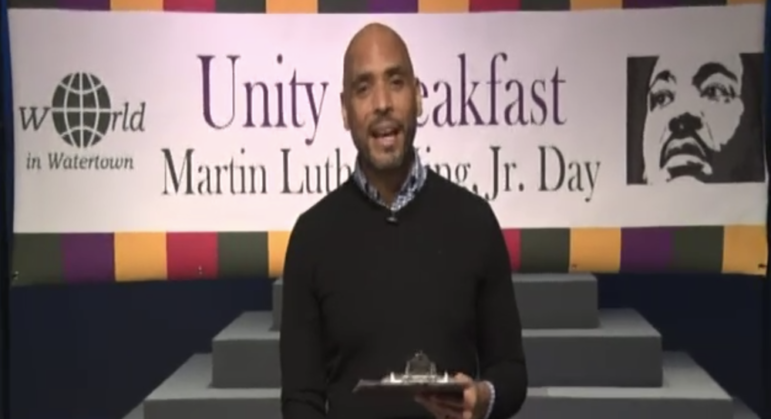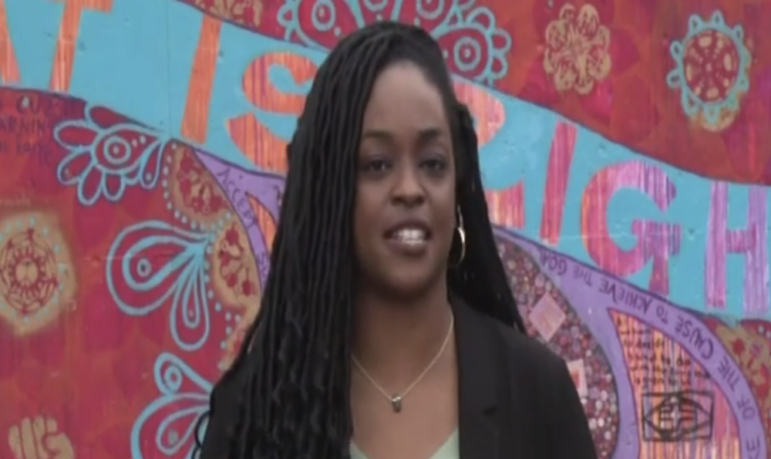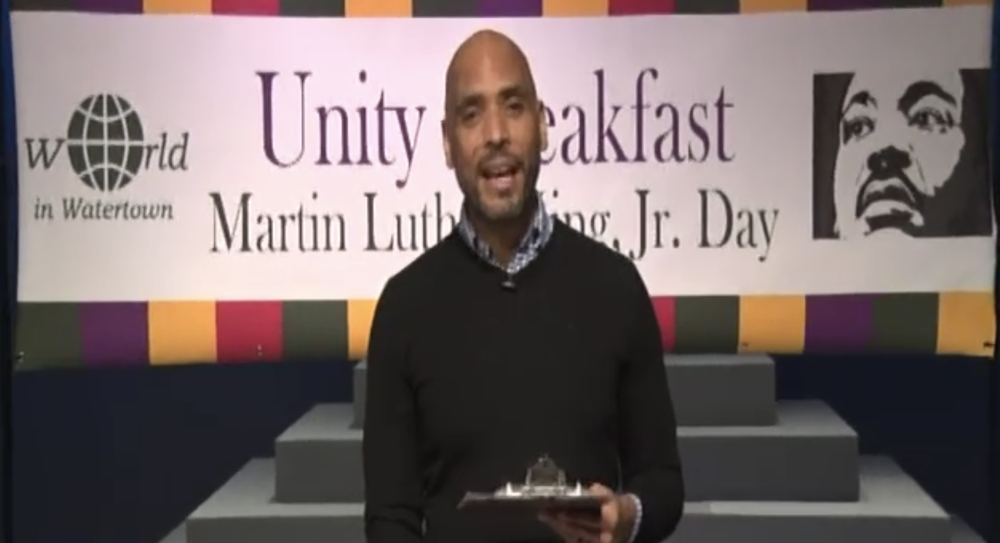
The 2020 Watertown Unity Breakfast had a different feel from years past, with the calls for action to fight for equity and against racism were more urgent and closer to home.
The annual Martin Luther King Jr. Day event hosted by World in Watertown was held virtually instead of the typical gathering at the Hellenic Cultural Center. The event also included more voices of the youth of Watertown.
The Unity Breakfast Committee decided to move beyond celebrating diversity in 2021, and focus on the need for inclusion and equity, said honorary host, Michael Bobbitt, artistic director of the New Repertory Theatre who will be leaving to become the executive director of the Mass. Cultural Council.
“I believe that inclusion, equity, diversity anti-racism, anti-oppression, and anti-white supremacy are all acts of love,” Bobbitt said. “We are trying to show love to people who have never been loved by this country. This is not a race war, this is an attempt to end a race war. And I believe that we can do it.”
Keynote Speaker Rev. Mariama White-Hammond, founding pastor of the New Roots AME Church said that while she prefers many of King’s other speeches, the lines of his “I Have a Dream” speech fits the moment that America is in currently.
The speech describes the 1963 March on Washington as people coming to “cash a check” for all people’s rights to Life, Liberty and the Pursuit of Happiness and other freedoms promised in the Constitution and the Declaration of Independence. King went on to say that America gave African-Americans a bad check which came back marked insufficient funds, but he refused to believe that the “Bank of Justice is bankrupt.”
He also said the moment called for urgency, and said “This is no time to engage in the luxury of cooling off or to take the tranquilizing drug of gradualism.”
White-Hammond said the United States has a choice of how to respond to the current crisis: look to return to life before or use the opportunity to make real changes in areas such as health care, climate change, and fighting racism.
“So my message to you is that I believe in this moment where the brokenness of our country is on full display, from the Coronavirus to the Capitol Insurrection, we are overwhelmed with images of strife and instability,” she said. “We can try to paper over these things and try to get back to normal or we could face this reality and work collectively to be better than we ever were before.”
When making the changes, White-Hammond said it is important to include those who have been excluded in the past and can bring “fresh ideas and energy.”
“I want to particularly encourage us to bring in young people who have been often less warped by the current reality and more able to see the possibilities,” White-Hammond said.
Student Essays
The Unity Breakfast included its traditional Martin Luther King Student Essay Contest winners, but also added more voices through the Watertown Story Share. Both groups shared stories of racism and racial bias they or their family has faced.
Watertown Middle School essay contest winner Jeylani Thiam wrote about when a classmate in his sixth-grade Spanish class called him the “N-word,” for which he substituted “subhuman” in his essay. He recalled that it came out of no where, and though it was not spoken in a loud voice, several nearby students also heard the boy call him that.
“Looking back at this moment I can’t help but feel warmth and compassion towards the person who called me subhuman. You might think I’m crazy. You might ask myself why I am not seeking punishment or vengeance against them?” Thiam read. “Well, at first that is exactly what I was seeking. I wanted to see this guy suffer the consequences of his actions. I wanted to scream in his face and tell him everything bad I thought of him. But I realized this would not solve anything. It would only add more hate to the world. So instead of feeling hate I started to feel kindness, so I didn’t yell in anyone’s face.”
Johanna Hernandez’s winning high school essay recalled a family story about the time when her mother and two sisters were verbally accosted by a man while they were at Lizzy’s Ice Cream in Waltham.
They had just had a nice day at the Mexican Independence Day festival in East Boston and wore T-shirts with the Mexican flag on them.
A man came up to them when he heard them speaking Spanish and said, “You’re not supposed to wear those shirts. If you’re not from here, go back to your country.”
The man’s voice went from agitated to yelling, Hernandez said, and her sisters became scared.
“My mother started getting scared but got the courage to say, ‘We just came from a festival and we have the right to speak whatever language we want. You are scaring my children. We didn’t disrespect you in any way but you are.” Hernandez read. “People around her started to defend her and let her know that they cared. One beautiful day turned into a horrible day that they would remember for the rest of their lives.”
Hernandez wrote that she thought her mother reacted the right way by not getting mad, because that was what the man wanted. She said she admired MLK’s teachings to fight hate with non-violence and for the world to be equal and for everyone to get along.
“Even though that’s not how society is these days, I’m thankful for the people who do try to change the world for the better. I’m thankful for the people who discriminate because we learn from those situations. Those situations make us stronger,” she said.
Story Share
A new addition to the Unity Breakfast was the Story Share. The effort created as an effort to capture the stories of Watertown residents about discrimination and racism, said Swathi Sivasubramanian, a middle school teacher who also coordinates the Story Share. The stories have been posted on the group’s Instagram account, and a few were shared during the Unity Breakfast.
Shivani Sharma, a WHS student, recalled how she was uncomfortable when she was asked to read a passage in English class that had the “N-word” in it. Her teacher encouraged her to say it, adding that it was OK because it was for educational purposes and is not being said to offend someone.
Sharma still did not want to read it, and ultimately the teacher ended up reading the passage with the full N-word.
“There was no Black kids in the classroom, other than a few minorities and it was super awkward,” Sharma recalled. “That just made me think that nobody has the right to give anyone else permission to say the N-word. And it doesn’t matter who is in the room, nobody has the right to say the N-word, no matter where they are, if you are not Black.”
Sharma recalled that she still felt very uneasy, and ultimately led her to take part in an effort to change the curriculum in the Watertown Schools. She encouraged African-Americans and other minorities to take part.
LiaLah Mawada shared her experience at Watertown Middle School after she gave a speech about why it is not OK to use the N-word, even if the person doesn’t mean offense, was joking or even thinks they have “a pass.”
“You need to know, no matter what the reason was behind it, what you said was racist, and (you are saying) something that is hurtful, a word that is meant to degrade a humanbeing,” Mawada said.
Mawada said she knew she had to speak out, even though she knew she would get “a lot of hate” for it. After her speech, she was called the N-word in school. She also became a supporter of Black Lives Matter after the George Floyd murder, and was harassed on social media and through texts.
She also shared her story with a local news channel and helped push the Watertown Schools and the Town government to take a close look at racial issues and equity.
“Ever since I even went to the news with my story, I see people taking it more seriously now and I see that it started some type of movement in my Town. I’m really happy about that that because before everyone in Town, especially the white people would like to preach anti-racism when they don’t know anything about it,” Mawada said. “I like that change, but also it’s sad that I have to do that at a young age. I should be worrying about other things like when’s my homework due or my math test — am I going to fail or pass. That’s the things I should be worrying about, not, ‘Oh am I going to get killed because I did the wrong thing in front of a police officer.’”
Some of the stories are done anonymously, including one shared by an employee of the Town who said he was discriminated against by his boss and is fearful of losing his job. Sivasubramanian said that “in order to safely speak about their experience of racism, people of color often need the protection of anonymity.”
People can share a story by sending it in an email watertown.storyshare@gmail.com or through a direct message to @watertown.storyshare on Instagram.
Unity Award Winner

The 2020 Unity Award went to Rhode Moise, program director at the Watertown Boys & Girls Club. One reason why she was chosen for the award was her work on racial issues at the Club and in Watertown, said Claire Fabian, a WHS student who is on the Unity Award Committee.
“Following the murder of George Floyd, Rhode was front and center in holding the Club and the community accountable for combatting systemic racism,” Fabian said. “Over the summer and fall she has been very active with the Kingian Response Team, in its work with the Police Department, the School Department and the greater community to initiate anti-racist projects and programs.”
One of Moise’s efforts has been to build relationships between the children at the Boys & Girls Club and the Watertown Police.
“She is especially interested in getting Watertown’s youth, particularly youth of color, interested in careers in law enforcement, so that our police force may better reflect the diversity of the community it serves,” Fabian said.
During her acceptance speech, Moise gave the audience a call to action.
“We are asking you to do something because you no longer can afford to stay silent. We no longer can afford for you to stay behind your computer and click away. We have to do something to care for the future of the city and of this country,” Moise said. “Thank you again. I appreciate all the amazing words and affirmations, but this is not about me. This is not about the people that you are so comfortable being around, it’s about the uncomfortable position that you need to put yourself in and it is about your future.”
Car Parade
In conjunction with the Unity Breakfast, an MLK Day Car Parade was held Monday afternoon.
The vehicles carried banners with quotes from Civil Rights leaders past and present, said Ruth Henry, a WMS teacher and member of the Kingian Response Team.
A group of about 40 people made the banners during three art banner building sessions held outside the Boys & Girls Club. WHS student Leyla Mandel said she enjoyed the camaraderie of the banner building.
“I felt like I was with people I hadn’t seen in so long,” Mandel said. “We were separated because of the pandemic and now we’re all together and we were making art and we were writing quotes of past and present Civil Rights leaders. The experience was so good.”
Tribute
The Unity Breakfast started with a tribute to Sue Kuder, who passed away in July 2020. She was one of the founders of World in Watertown, and by extension, the Unity Breakfast, said David Downes, a member of the World in Watertown.
Will Twombly, a World in Watertown member, said Kuder was humble about he work, but he said she made a big impact.
“By her example, Sue inspired generations of folks in Town to get involved in ways that have made our community and the larger world a more aware, just and caring place,” Twombly said.
See the Unity Breakfast video on Watertown Cable Access TV by clicking here.
